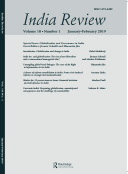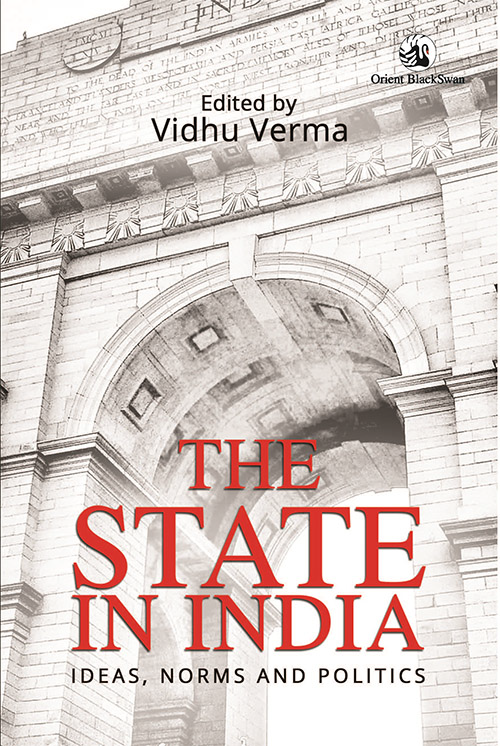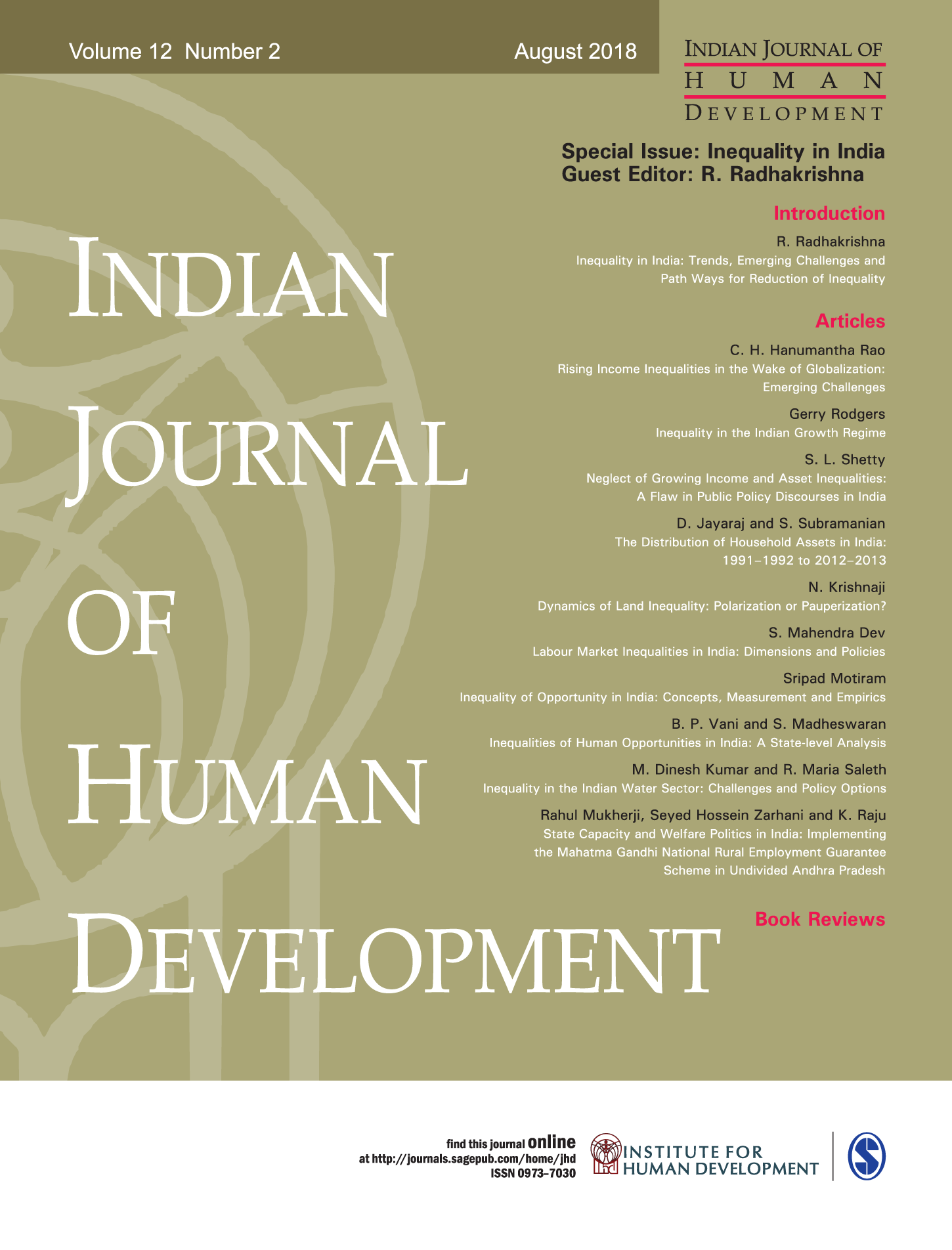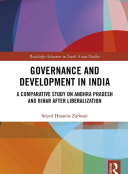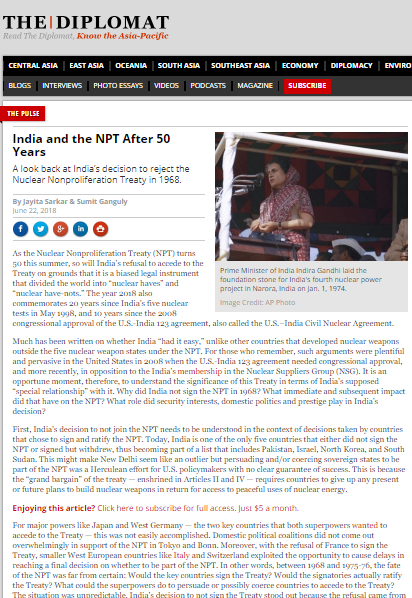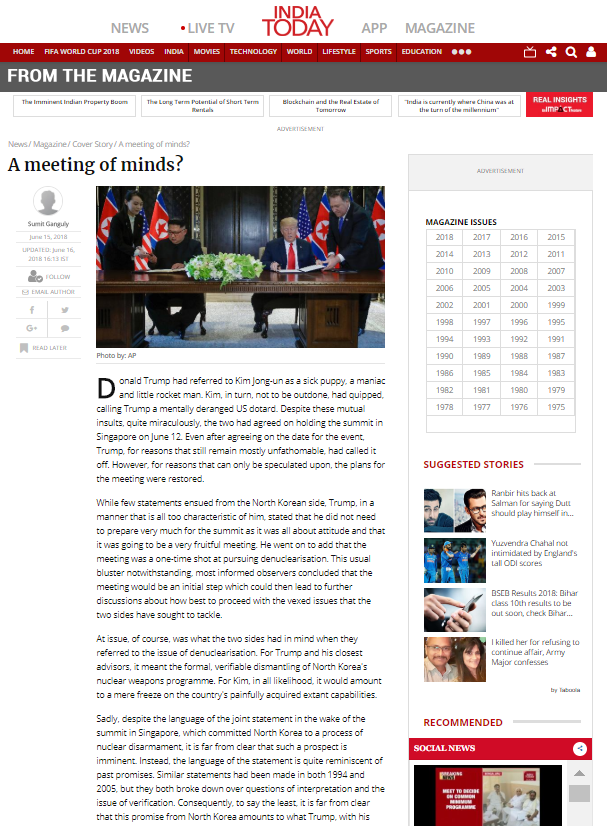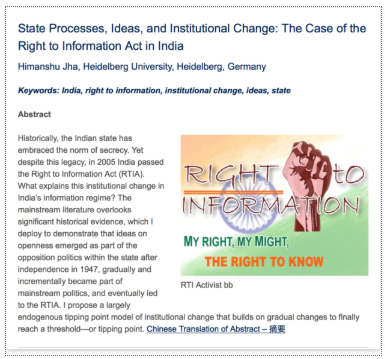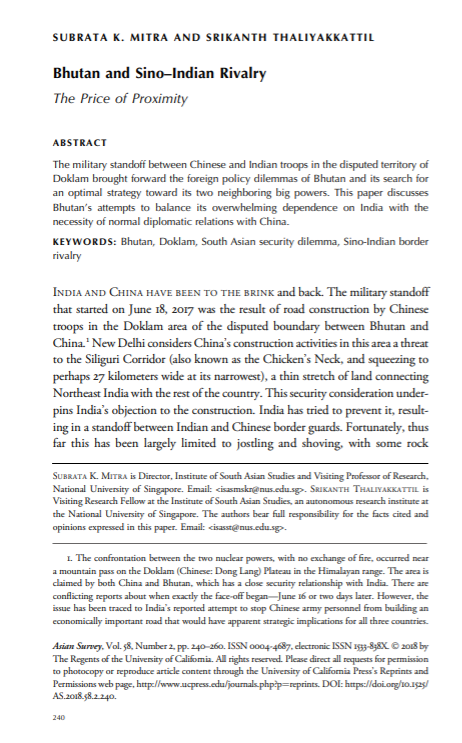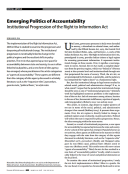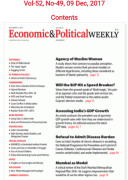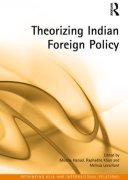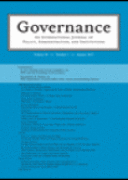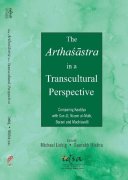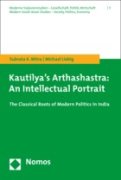Publikationen
2019
Jha, Himanshu & Ganguly, Sumit (2019)
The BJP’s Puzzling Victory: Was It about Hindu Nationalism?
The Washington Quarterly Vol. 42,3
|
|
Dr. Himanshu Jha has co-authored an article with Prof. Sumit Ganguly in the Washington Quarterly. Article explains BJP’s resounding victory and its ramifications for India’s foreign policy. Access this article here. |
Jha, Himanshu & Schöttli, Jivanta (eds.) (2019)
Special Issue of India Review on "Globalization and Governance in India"
India Review Vol. 18,1
|
|
Prof. Rahul Mukherji provides the introduction to the latest journal issue which has insightful articles authored by Dr.Jivanta Schottli and Prof. Markus Pohlmann, Dr.Himanshu Jha, Dr.Aseema Sinha and Dr. Markus Pauli. The special issue ends with an epilogue by Prof. Subrata K Mitra. This special issue can be accessed here. |
Mukherji, Rahul & Jha, Himanshu (2019)
The State, Social Policy and Welfare: Reflections on Andhra Pradesh and West Bengal
in The State in India: Ideas, Norms and Politics, edited by Vidhu Verma
New Delhi: Orient Blackswan
|
|
The chapter examines some of the conditions under which the state is likely to be more capable in delivering welfare results. It argues that ideas held within the bureaucracy are as important as the political will to support such proposals. Ideas and competence within the technocracy matter, as much as the political support for governance projects. This framework is then applied to welfare provisioning in two comparable cases.The first was the successful implementation of the Mahatma Gandhi National Rural Employment Guarantee Scheme (MGNREGS) in undivided Andhra Pradesh. The second is the relative failure of the state in West Bengal to implement the same program in the early years. The edited book offers an insightful overview of the literature on the state and showcases the interplay of state and society in new sites: processes of globalisation, assertions of sovereignty, and across the regional and local. The volume moves beyond the state question to interrogate how the state can shape concepts, ideas, and institutions central to our lives. The rise of the welfare state with extensive social policies of affirmative action and the emerging penal state are some of the core themes of the volume. |
2018
Mukherji, Rahul & Zarhani, Seyed Hossein & K. Raju (2018)
State Capacity and Welfare Politics in India: Implementing the Mahatma Gandhi National Rural Employment Guarantee Scheme in Undivided Andhra Pradesh
Indian Journal of Human Development, Vol. 12,2
|
|
The article "State Capacity and Welfare Politics in India: Implementing the Mahatma Gandhi National Rural Employment Guarantee Scheme in Undivided Andhra Pradesh" by Mukherji/Zarhani/Raju argues that the Indian state can develop the capacity to deliver economic rights in a citizen-friendly way, despite serious challenges posed by patronage politics and clientelism. Clientelistic politics reveals why the Indian state fails to deliver the basic rights such as the right to work, health and education. We argue that the ability of the state to deliver owes a lot to bureaucratic puzzling and political powering over developmental ideas in a path-dependent way. The article was published in the Indian Journal of Human Development. See details here. |
Zarhani, Dr. Seyed Hossein (2018)
Governance and Development in India - A Comparative Study on Andhra Pradesh and Bihar after Liberalization
Series: Routledge Advances in South Asian Studies
|
|
"Governance and Development in India - A Comparative Study on Andhra Pradesh and Bihar after Liberalization“ by Dr. Seyed Hossein Zarhani (Department of Political Science, SAI) compares two Indian subnational states, Andhra Pradesh and Bihar. The study of the political economy of development in India is significant as India has emerged as one of the fastest-growing countries during the last three decades and the rate of economic growth and poverty reduction have not been matched in India’s subnational states. The book was released as part of the series „Routledge Advances in South Asian Studies“. Further information is available here. |
Ganguly, Sumit and Jayita Sarkar (2018)
India and the NPT After 50 Years: A look back at India’s decision to reject the Nuclear Nonproliferation Treaty in 1968.
The Diplomat. June 22.
|
|
In India and the NPT After 50 Years: A look back at India’s decision to reject the Nuclear Nonproliferation Treaty in 1968 the authors cerebrate the 50 years of Nuclear Nonproliferation Treaty and go back to reflect on India's decision to reject the Treaty. The article is available here. |
Ganguly, Sumit (2018)
A meeting of minds?
India Today. June 15.
|
|
'A meeting of minds?' points to the recent meeting between U.S. President Donald Trump and the North Korean leader Kim Jong-un that created controversy at the international level even before it has taken place. The author reflexes on the statements of the summit in Singapore that has taken place on June 12. The article is available here. |
Jha, Himanshu (2018)
State Processes, Ideas, and Institutional Change: The Case of the Right to Information Act in India
Pacific Affairs, 91(2)![]()
|
|
Historically, the Indian state has embraced the norm of secrecy. Yet despite this legacy, in 2005 India passed the Right to Information Act (RTIA). What explains this institutional change in India’s information regime? The mainstream literature overlooks significant historical evidence, which I deploy to demonstrate that ideas on openness emerged as part of the opposition politics within the state after independence in 1947, gradually and incrementally became part of mainstream politics, and eventually led to the RTIA. I propose a largely endogenous model of institutional change that builds on gradual changes to finally reach a threshold—or tipping point. The article is available here. |
Mitra, Subrata K. and Srikanth Thaliyakkattil (2018)
Bhutan and Sino–Indian Rivalry: The Price of Proximity
Asian Survey, 58(2): 240-260.![]()
|
|
The military standoff between Chinese and Indian troops in the disputed territory of Doklam brought forward the foreign policy dilemmas of Bhutan and its search for an optimal strategy toward its two neighboring big powers. This paper discusses Bhutan’s attempts to balance its overwhelming dependence on India with the necessity of normal diplomatic relations with China. The article is available here. |
Jha, Himanshu (2018)
Emerging Politics of Accountability: Institutional Progression of the Right to Information Act
Economic & Political Weekly, 53(10): 47–53
|
|
The implementation of the Right to Information Act, 2005 in Bihar is studied to examine the progression and deepening of institutional change. The institutional progression is inextricably linked to change in the political regime and the resultant shifts in policy priorities. The RTI Act has opened up a new space for accountability between state and society, its use is often linked to local politics, and a new form of elite agency has emerged, whose practitioners this article categorises as “agents of accountability.” These agents are different from the category of elite agency discussed in scholarly literature, such as the “expansive elite,” pyraveekars, gaon ka neta, “political fixers,” or naya netas. The article is available here. |
2017
Mukherji, Rahul & Jha, Himanshu (2017)
Bureaucratic Rationality, Political Will, and State Capacity - MGNREGS in Undivided Andhra Pradesh
Economic & Political Weekly, 52(49): 53–60
|
|
The successful implementation of the Mahatma Gandhi National Rural Employment Guarantee Scheme in undivided Andhra Pradesh underlines the triumph of citizen formation over patron-client politics, aided by a democratic politics. This article argues that its success in Andhra Pradesh depended heavily on how the ideas within the rural development bureaucracy interacted with the political executive. This synergy engendered a state’s capacity to insulate a committed bureaucracy from powerful farmers and construction companies who had a clear interest in thwarting the programme. Elections can in a democracy elevate citizen concern over particularistic populism, when political will is matched by ideational conviction in the bureaucracy. The article is available here. |
Beitelmair-Berini, Bernhard. (2017),
Theorizing Indian Strategic Culture(s): Taking Stock of a Controversial Debate,
in Theorizing India’s Foreign Policy edited by Mischa Hansel, Raphaelle Khan and Melissa Levaillant,
New York and London: Routledge
|
|
The book "Theorizing India’s Foreign Policy” recently published by Routledge, has a chapter by Bernhard Beitelmair-Berini (PhD researcher and lecturer at the Department of Political Science of the SAI) on “Theorizing Indian Strategic Culture(s): Taking Stock of a Controversial Debate“. The chapter by Bernhard Beitelmair-Berini takes issue with the popular notion of a strategic culture deficit in India. He argues that at least four strategic subcultures compete with each other in Indian foreign policy discourses: Nehruvian, Liberal Globalist, Leftists and Hindu Revivalist. These schools of thinking originate from, (re)interpret and/or mix a vast array of ancient, pre- and post-independence intellectual sources. This chapter ultimately highlights the need to foster a discussion between the social sciences and the humanities, particularly literature and language studies, in order to theorise traditions of strategic thought on India. “Theorizing Indian Foreign Policy” draws together the study of contemporary Indian foreign policy. For more information please click here. |
Mukherji, Rahul. (2017),
Governance Reform in a Weak State: Thirty Years of Indian Experience
Governance, 30: 53–58
|
|
The last three decades have witnessed governance transformations in India and China. China gave up autarkic communism and engaged the world. India gradually gave up its somewhat more liberal import substitution-based closed economy model and engaged the world by giving greater primacy to private companies. India began to open up the economy to private investment from the mid-1970s but trade and international orientation arrived only after 1991. By this time, the Chinese economy had become a powerhouse. India's rates of economic growth surpassed China's only in recent years, when the Chinese economy had become much larger than India's. India is the most rapidly growing economy among the Group of 20 countries that discuss the globe's financial architecture. India is home to a weak state in an eco-system powerfully shaped by social forces. The state can neither make a Dengist nor a Lee Kuan Yew type move to swiftly turn the page toward a new policy paradigm. Comprehending India's path requires reconciliation of two apparently contradictory views of the state. The first is the view that India is a weak state. Second, despite being a soft state, policy ideas and changes in worldviews within the state, matter. Third, and consistent with the second point, the Indian model is neither a coerced version of the Washington consensus nor is it a veneration of the Beijing consensus. Policy makers are acutely aware of global developmental paths. What paths they choose, and how gradually such paths get entrenched, despite social forces, lies at the heart of India's developmental journey. This article discusses the nature of India's gradual model governing growth and welfare. |
Liebig, Michael and Saurabh Mishra (eds.). (2017),
The Arthashastra in a Transcultural Perspective:
Comparing Kautilya with Sun-Zi, Nizam al- Mulk, Barani and Machiavelli
New Delhi: IDSA/Pentagon Press
|
|
The edited volume The Arthaśātra in a Transcultural Perspective: Comparing Kautilya with Sun-Zi, Nizam al-Mulk, Barani and Machiavelli is the product of a collaborative research effort by the Institute for Defence Studies and Analyses (IDSA), New Delhi; South Asia Institute (SAI), Heidelberg University; and Institute of South Asian Studies (ISAS), National University Singapore. Political Science and International Relations are still predominantly Eurocentric and based on European intellectual resources, while India, with a long civilisational and philosophical history, is credited with no contribution to the evolution of the Political Science and IR theory. Notably, Kautilya’s Arthaśātra, a foundational text of Political Science and IR theory, has, so far, been ignored or marginalized in these disciplines. The volume explores the conditions of the possibility of a ‘migration’ of Kautilyan thought-figures from South Asia to the Mediterrean. In this idea-migration – and hybridization -- across cultural and historical spaces, pre-Islamic and Islamic Persianate cultural space is of special significance. The chapters with authors are: ‘Introduction’ by Michael Liebig and Saurabh Mishra; ‘Kautilya Redux? Re-use, Hybridity, Trans-cultural Flow and Resilience of the State in India’ by Subrata K. Mitra (ISAS); ‘Understanding Kautilya’s Arthaśāstra: Origination, Migration and Diffusion’ by Pradeep Kumar Gautam (IDSA);‘Kautilya and Machiavelli in a comparative perspective’ by Michael Liebig (SAI); ‘Arthaśāstra - Reflections on Thought and Theory’ by Medha Bisht’ (South Asian University, New Delhi);‘Rājadharma, legitimacy and sovereignty in the Arthaśāstra’ by Saurabh Mishra (IDSA),‘Kautilya and Sun- Zi on War and Strategy: Exploratory Comparative Analysis ’ by M.S. Prathibha (IDSA) , and ‘Fatāwā-ye jahāndāri: Hybrid Political Theory in the Delhi Sultanate (Perso-Islamic and Endogenous Traditions of Statecraft in India)’ by Seyed Hossein Zarhani (SAI). |
2016
Mitra, Subrata Kumar and Michael Liebig (2016),
Kautilya's Arthashastra: An Intellectual Portrait: The Classical Roots of Modern Politics in India
Baden-Baden: Nomos
|
|
Kautilya’s Arthashastra: An Intellectual portrait – The Classical Roots of Modern Politics in India showcases the endogenous politico-strategic thought that underpins India’s rise in the 21st century. The political institutions and processes in contemporary India have remained deeply grounded in its pre-modern political heritage, succinctly codified in Kautilya’s Arthashastra. These themes are explored through such bridge concepts as the ‘modernity of tradition’ and the ‘re-use of the past’ in tackling contemporary political problems. These concepts are key factors that explain the resilience and stability of India’s hybrid political institutions and democratic system as well as its foreign policy conduct. Even though Kautilya’s Arthashastra is a foundational text of Political Science and International Relations theory, it has, so far, been largely marginalized in Political Science. Mitra’s and Liebig’s book is meant to change that. As well, the volume provides a major contribution to South Asian area studies, comparative politics and comparative political theory. |




